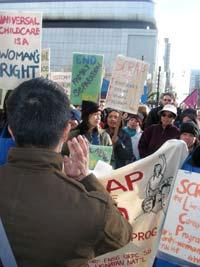‘Superficial changes won’t help caregivers’

Filipino caregivers in Canada say the proposed changes by Ottawa to improve the Live-in Caregiver Program (LCP), are superficial and are demanding concrete action to stop what they describe as “modern-day slavery.”
“The recent changes do not even scratch the surface of improving the situation of live-in caregivers,” said Glecy Duran, Chairperson of SIKLAB – B.C., an organization for Filipino migrant workers and their families.
“As long as the fundamental pillars of the program remain untouched, no meaningful change for the better is possible,” Duran said.
The Live-in Caregiver Program is a component of the Temporary Foreign Worker Program, and assists employers in recruiting caregivers to live and work in the homes of those for whom they are caring in order to provide child care or support for seniors or people with disabilities.
More than 100,000 have come since the LCP’s inception in 1992. Over 95% of those entering Canada under the LCP are women from the Philippines.
The program facilitates the entry of qualified caregivers into Canada when there is a shortage of Canadians or permanent residents to fill those positions.
In return, the program allows live-in caregivers to apply for permanent residence in Canada, after working for two years within the first three years of entry into Canada, to work in the program.
As part of their continued demands for change to the LCP Filipino women and concerned community members rallied to reiterate and heighten their demands to scrap the “abuse-laden immigration and labour program” earlier this month at the Vancouver Art Gallery.
Armed with pots and pans, aprons, and strollers asserting their political slogans, voices of youth, migrant workers, mothers, and caregivers united to expose how the program does not “work for everyone” as defended by Immigration Minister Jason Kenney, SIKLAB – B.C said.
“The LCP is a federal program that recruits live-in caregivers with only temporary immigration status. They are forced to live-in their employer’s homes with an employer-specific work permit and must complete 24 months of this type of work within three years of entry into Canada under the program’s present arrangement.
“They are not allowed to bring their families with them during their period of temporary work often burdened with very low wages, precarious working conditions, and human rights abuses,” it said.
“Extending the length of time to complete the mandatory period of work from three to four years, the choice between calculating the work time period as 24 months or 3900 hours, and waive the second medical examination, means no real change to the program at all,” stated Duran.
“Instead, the changes further entrench the use of temporary foreign labour, divides workers, and undermines the struggle for universal child care, health care, as well as women’s and workers’ rights in Canada,” she explained.
The protestors rejected the notion that the LCP is an issue that solely concerns the Filipino community, but rather, “it affects all Canadians because the LCP is Canada’s de-facto national childcare program and privatized health care that only benefits those who can afford it.”
“A program that is exploitative down to its very core, the LCP must be done away with completely,” said Duran.
“With recent attempts to dampen our concerted efforts to expose and oppose the LCP with a bureaucratic facelift, we are even more determined to put an end to the misery our women suffer under this program of modern-day slavery,” she concluded.
Immigration Minister Jason Kenney, when announcing proposed changes to the LCP, said the new rules will empower the caregivers to ensure that they are not subject to abusive situations, ensure that they are not exploited by unscrupulous consultants and provide a fair, clear pathway to permanent residency.
The planned changes include, eliminating the requirement that all live-in caregivers undergo a second medical examination.
In addition, the period allowed to gain the required work experience to apply for permanent residence will be extended from three years to four years. This responds to concerns that some live-in caregivers are not able to meet the requirement within the three years, and would allow for unforeseen breaks in employment due to events such as pregnancies, illnesses, or loss of employment when people need to find a new employer.
The changes also include a measure whereby live-in caregivers who work overtime could apply for permanent residency even faster than they can now.
Under additional improvements to the program, employers of live-in caregivers will be required by the federal government, working with the provinces, to pay travel costs, medical insurance, workplace safety insurance, and any recruiting fees owed to third parties. No longer will caregivers be paying people to get jobs in Canada.






